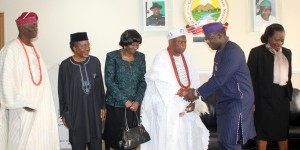
L-R: Ekiti State delegates to the National Conference, Dr. Kunle Olajide; Prof. Akin Oyebode; Prof. Mrs. Olabisi Aina; Chairman State Council of Obas, Oba Adamo Babalola; Governor, Kayode Fayemi; and Deputy Governor, Prof. Modupe Adelabu, during a courtesy visit by the team to the Governor, in Ado-Ekiti.
Delegates from Ekiti State in the forthcoming National Conference on Wednesday met with different stakeholders in the State to gather their views and agitations to be presented at the conference.
The pre-National Conference Consultative Summit which was held at the Bishop Abiodun Adetiloye Hall in Ado Ekiti, was witnessed by traditional rulers, religious leaders, representatives of different communities, groups and associations as well as human rights activist, Mr Femi Falana.
Speaking at the summit, the State Governor, Dr Kayode Fayemi lamented the flaws in the 1999 Constitution which is supposed to be the guiding document for governance; saying that the constitution was not a product of the people but was foisted on them by the then departing Military government.
The Governor expressed worry that constitutional reviews since 1999 have been unduly politicized and have failed to yield an authentic national document with “legitimate buy-in from all over the federation”.
Dr Fayemi who opined that the goal of the conference should first of all be to evolve a people-oriented constitution that embodies the common aspirations of all Nigerians stressed the need to review items on the concurrent, exclusive and residual lists in order to free states from “strangulation by an overbearing Federal Government”.
“Nigeria has long been beset by a myriad of challenges. At present, the trend and tenor of our problems are alarming. The failure of the institutional machinery put in place to steer this nation has left the majority of the Nigerian people with a keen disillusionment and a sense that the formal mechanisms of governance are not capable of addressing their priorities and issues. The problems facing us as we struggle to create a sustainable democracy and an equitable future tend to generate fear and anxiety; and often threaten the union among the federating states of the country”, he said.
On resource control and fiscal federalism, the Governor advocated the entrenchment of equity and justice as well as stimulate productivity with a functional resource control regime; adding that the level of responsibilities of federating states places strong financial burden on them as against the imbalance in favour of the central government.
Fayemi asserted that the sharing formula for the allocation of resources and revenue is lopsided even as oil producing states see non-oil producing states as parasites while the latter see the extra revenue accruable to the oil producing states based on derivation as an unnecessary indulgence.
He said that the over-reliance of States on federal government inhibits the development of States; saying that the practice of semi-unitary system of government under the guise of federalism has done more harm than good to the progress of Nigeria.
“Issues of national security, insurgency and terrorism could better be handled by all tiers of government. This brings to mind the issue of the establishment of multi-level policing. Since national security is not an issue of peculiar interest and concern to the central/federal government, there should be room for policing which will encompass a comprehensive security network for the total wellbeing of the entire citizenry. I also hope that attention would be given to these issues during your deliberations”, he opined.
Earlier, one of the delegates who presented the highlights of the view of the Yoruba race, Dr Kunle Olajide said the Yorubas do not intend to request secession but it is expedient to discuss secession and tackle it headlong in the interest of national unity.
Olajide who also advocated a parliamentary system of government called for the decentralization of the country into region which are well empowered to perform their roles in true federalism as opposed to the pseudo-federalism currently in play.
Last modified: March 6, 2014
